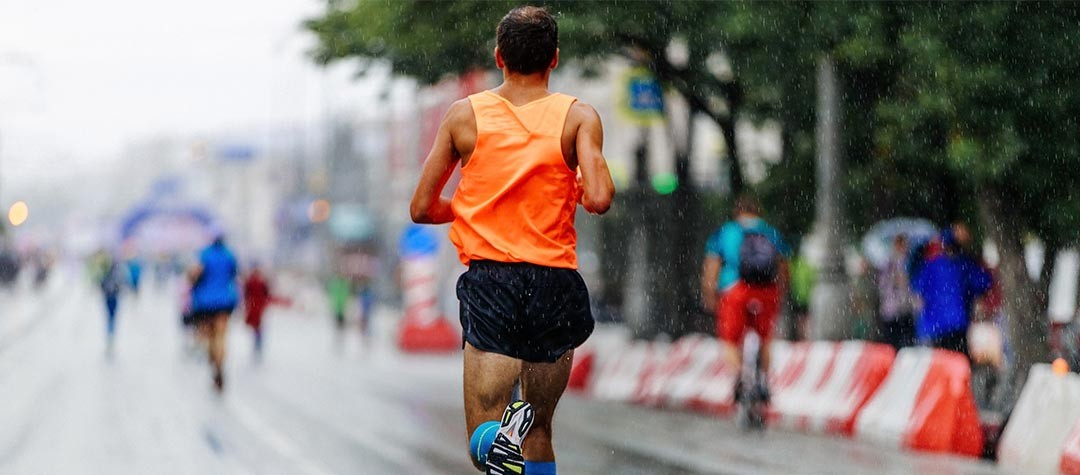The human body is incredibly effective at giving you signs or indications that something is wrong and you need to slow down or rest up. Here’s how to spot the signs that your body or mind is rebelling.
It's perfectly normal to have the odd day where you feel tired, unmotivated or have an ache or pain. However, if these signs persist for several days or more, then it’s time to bury that desire to plough on with your training regardless and to pay attention to what your body is telling you. Here are 10 red flags to watch out for.
1. Over-training
In order to build fitness as a runner you need to push the boundaries of your current fitness level. This is achieved through a cycle of stress and rest. You need to stress your body with training and then rest in order to let the physiological adaptations and gains in fitness occur.
However, the optimal balance between training stress and recovery can be a fine line and if you continue to place your body under long periods of stress without adequate recovery or structure you run the very real risk of suffering from ‘ overtraining ’.
The symptoms of overtraining aren’t necessarily black or white so without assessing various biomarkers through a blood test it can be tricky to spot the signs. Here are just some of the red flags to be aware of:
- Poor performance in racing and training.
- Mood disturbances – finding yourself irritable and snappy on a regular basis.
- Fatigue – low energy levels throughout the day and feeling as if you need more sleep.
- Disturbed sleeping patterns – waking up early or struggling to get to sleep despite being tired.
- Persistent muscle soreness – always feeling ‘heavy legged’ in training and slow recovery between sessions.
- Poor immune function- suffering from frequent colds and respiratory tract infections.
- Loss of competitive desire and enthusiasm.
Remember that stress outside of running can also significantly affect your ability to recover so you may need to adjust your training load if you’re experiencing a lot of stress at work for example.
2. Injury
Your body is very good at giving you warning signs that it’s time to back off, and niggles are just that. Runners are also very good at ignoring these warning signs and ploughing on with training in the belief they are being tough. If an ache or pain persists for more than a few days then it’s best to switch to an alternative method of training, such as aqua jogging, cycling or swimming. This will enable your body to heal and if possible, seek some specialist advice from a physiotherapist . Cross training is a great way to maintain aerobic fitness and you’ll be back on the road in no time.
3. Dehydration
Without realising, many runners are actually in a chronic state of mild dehydration. As a runner your fluid requirements are increased; even on cold winter days you lose fluid through sweat. Many of us are guilty of consuming largely caffeinated beverages which can have a diuretic effect and fail to hydrate with enough water. If you are feeling tired and sluggish or frequently suffer from an afternoon slump in energy levels you could be dehydrated. Dry skin, dry lips, dizziness and headaches are also telltale signs. The easiest way to keep tabs on your hydration status is to monitor the colour of your urine. Pale or straw coloured urine suggests optimal hydration.
4. Under-fuelling
Many runners fail to realise the importance of both quality and quantity when it comes to nutrition . Without fuelling your engine adequately you are unlikely to reach your full potential and risk succumbing to frequent illness and injury. If you are constantly craving sugar, caffeine, fat or salt it may be your body’s way of telling you that your diet is lacking vital nutrients. In today’s society, low carbohydrate diets are just one of the latest fitness fads, however for endurance athletes they are a recipe for disaster because they starve the muscles of the primary fuel they need for endurance performance. Without adequate carbs you will most likely feel tired and sluggish and will be unable to run at the higher intensities that will promote gains in fitness. Restricting your carbohydrate intake will also make you more susceptible to illness and injury.
5. Performance plateau
Many runners experience a plateau in running performance at some point. If you find that despite increasing the quality or quantity of your training your rate of progression slows or even regresses then it’s time to sit up and take notice. Hitting a performance plateau can often be due to a lack of variety in your training programme. After several weeks your body will adapt to a training stimulus so in order to make further improvements in fitness you’ll need to change the stimulus. Essentially if you keep doing the same thing then you will keep getting the same results! Try incorporating something different into your weekly training mix, swap some standard intervals for some hill work or a fartlek for example.
6. Boredom
Whilst it is perfectly normal to experience the odd day where your motivation is lacking, if this happens on a regular basis then it could be indicative of overtraining or a sign that you need to spice things up a bit. The mind responds well to changes in training stimuli so if you’re suffering from a bit of motivational funk then why not try something different? Arrange to meet some fellow runners for example. Training with others not only makes tough sessions more enjoyable, the positive peer pressure can push you to hit splits that would be difficult to do solo.
7. Inadequate or disturbed sleep
Disturbed sleeping patterns, such as waking up early or struggling to get to sleep despite being tired are often an early sign of overtraining. Sleep is a runner’s most powerful recovery tool. Your body uses this natural recovery mechanism to release Human Growth Hormone, which enables damaged muscle tissue to recover and regenerate. In fact a recent study has shown that athletes who sleep on average for less than 8 hours a night have 1.7 times greater risk of becoming injured than those who sleep for 8 hours or more.
8. Frequent illness
Moderate exercise should actually improve your immune function, making you less susceptible to illness. However after strenuous exercise you experience a temporary dip in immune function as your body uses its energy kick-start the recovery process. If you are suffering from frequent illness, particularly colds and respiratory infections it could be a sign that your body struggling to meet the demands that you are placing on it. Ploughing on with training regardless of illness is not a display of toughness and it can be dangerous; what was a minor sore throat can quickly escalate into a full blown cold, or worst still a chest infection.
9. Changes in heart rate
Changes in your heart rate at rest and during exercise can be a clear indicator that your body is under additional stress and requires some rest and relaxation. Try to get into the habit of taking your resting heart rate as soon as you wake up in the morning. Keep a note of it and monitor any changes. If your resting heart rate is up by 5 beats then it may be a sign that you’re body isn’t quite recovered from yesterday’s training so it would be wise to take it easy. A rise of 10 beats or more is usually indicative that your body is fighting an infection or is very fatigued so in this instance it is recommended that you take a complete day of rest to allow your body the recovery it needs. When an athlete shows a good response to training, their heart rate during exercise should decrease. However decreased heart rate at all exercise intensities (including maximal) can be a sign of overreaching in endurance athletes, together with high feelings of perceived fatigue.
10. Loss of appetite
A healthy athlete is a hungry athlete. When training your energy demands increase and you should find that your appetite will also increase as a result. Although it is perfectly normal for your appetite to be suppressed on a short-term basis after particularly hard training sessions or races, a longer term suppression of appetite could indicate that you are overtraining.















